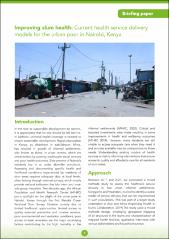Improving slum health: Current health service delivery models for the urban poor in Nairobi, Kenya
| dc.contributor.author | Bakibinga, Pauline | |
| dc.contributor.author | Kibe, Peter | |
| dc.contributor.author | Kabaria, Caroline | |
| dc.contributor.author | Kisia, Lyagamula | |
| dc.contributor.author | Mbuthia, Michelle | |
| dc.contributor.author | Kyobutungi, Catherine | |
| dc.date.accessioned | 2024-02-01T07:31:19Z | |
| dc.date.available | 2024-02-01T07:31:19Z | |
| dc.date.issued | 2021 | |
| dc.identifier.uri | https://warwick.ac.uk/fac/sci/med/about/centres/wcfgh/slums/resources/slum_health_aphrc_policy_brief.pdf | |
| dc.identifier.uri | http://knowhub.aphrc.org/handle/123456789/642 | |
| dc.description.abstract | In the race to sustainable development by nations, it is appreciated that no one should be left behind. In addition, universal health coverage is needed to ensure sustainable development. Rapid urbanization in Kenya, as elsewhere in sub-Saharan Africa, has resulted in growth of informal settlements, also known as slums, in urban centres, which are characterized by poverty, inadequate social services and poor health outcomes. Sixty percent of Nairobi’s residents live in or under slum-like conditions. Assessing and documenting specific health and livelihood conditions experienced by residents of slum areas requires adequate data at local levels, often lacking through national surveys, which mostly provide national indicators that blur inter- and intrasub-group inequities. Two decades ago, the African Population and Health Research Center (APHRC) put a spotlight on the plight of the urban poor in Nairobi, Kenya through the first Nairobi CrossSectional Slum Survey. | |
| dc.subject | Population Dynamics | |
| dc.subject | Informal Settlements | |
| dc.subject | Slums | |
| dc.subject | Healthcare Service | |
| dc.subject | Health Care Facilities | |
| dc.title | Improving slum health: Current health service delivery models for the urban poor in Nairobi, Kenya | |
| dc.type | Policy Brief |
Fichier(s) constituant ce document
Ce document figure dans la(les) collection(s) suivante(s)
-
2021 [8]

